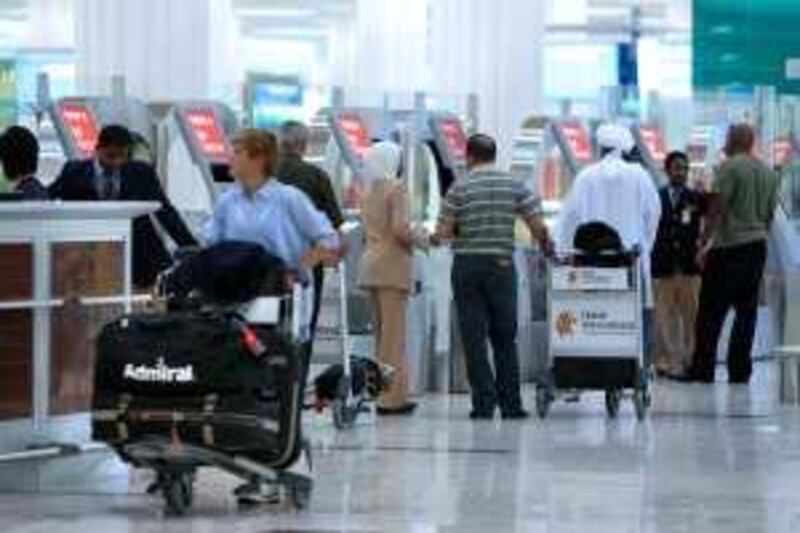Volumes for Dubai passengers and air cargo have surged in what officials say may be an early indicator of an economic rebound in the industry. Passenger traffic grew by 17 per cent last month to 3.81 million at Dubai International Airport compared with a year ago when the global downturn was at its worst. It was the eighth consecutive month of double-digit gains in passengers, while cargo increased by double digits for a fourth month, rising 31.5 per cent to 171,000 tonnes from January last year.
"If this is a bellwether for the rest of the year, then things are looking pretty good," said Paul Griffiths, the chief executive of Dubai Airports. "Dubai is on the leading edge of a rebound in global air traffic." Dubai International is one of the fastest-growing major airports in the world, passing Frankfurt, Singapore and Amsterdam to take fourth spot among international airports, according to statistics released for November.
The airport could reach third spot, overtaking Hong Kong, by the end of the year, said Mr Griffiths, who is forecasting a growth of 13.6 per cent for the year in passenger traffic to reach 46 million. Its major airline clients are Emirates Airline, a number of Indian airlines and flydubai, the new budget carrier. Travel and tourism account for about 25 per cent of the emirate's GDP and support tens of thousands of jobs. The latest statistics showed a strong increase in transit passengers and those arriving in the UAE as their final destination, including tourists and businesspeople, Mr Griffiths said.
Dubai had 7.5 million hotel stays in 2008 and hopes to double that to 15 million by 2015, although analysts have said the emirate needed to complete a number of theme parks and other attractions that had been put on hold to achieve this. With ambitious plans for Dubai's long-haul airline, Emirates, government officials have also embarked on a strategy to build an airport in Jebel Ali that will one day become the world's largest.
Mr Griffiths said this had led Dubai Airports to look at ways to improve facilities at its existing airport in Deira, Dubai International, while preparing to open Al Maktoum International Airport in Jebel Ali in late June, as part of a multibillion-dollar investment programme. In Deira, the airports company is overseeing construction of a third concourse for Emirates' superjumbo A380 aircraft, which will push the total capacity of the airport to 75 million when it opens in 2012.
Under its first phase, Al Maktoum airport, which opens this summer, will be able to handle 7 million passengers a year, but this will grow to 160 million when completed. Emirates will move to Al Maktoum when it is fully complete, which is expected to be in the early 2020s. Mr Griffiths said of the two airports: "The integration of capacity and demand between the two airports will naturally occur over time."
Initially, the new airport will cater to air cargo operations, and hopes to serve the sea-air cargo trade that has flourished in Dubai with the Jebel Ali seaport, the largest in the Middle East. But the new airport may not welcome the first passenger airlines until the end of this year or next year, Mr Griffiths said. Dubai Airports had earlier suggested passenger airlines could be posting flight summer schedules for Al Maktoum as early as this month.
Mr Griffiths said the airport would welcome airlines as soon as they were ready. "We are not forcing anyone," he said. "When airlines are ready to operate out of the new airport, we will happily take them." igale@thenational.ae





